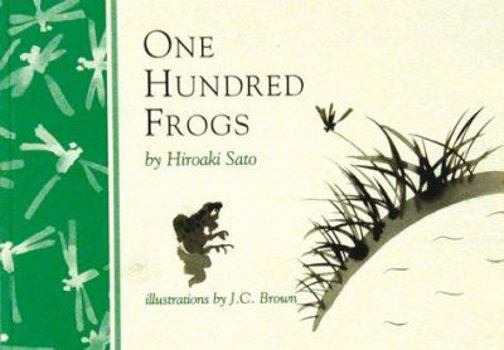One Hundred Frogs (Inklings)
Perhaps the most famous, and certainly the most translated haiku, is Basho's poem Old pond / Frog jumps in / The sound of water. In this book, Sato has collected some 135 translations, versions,... This description may be from another edition of this product.
Format:Paperback
Language:English
ISBN:0834803356
ISBN13:9780834803350
Release Date:January 1995
Publisher:Weatherhill
Length:128 Pages
Weight:1.50 lbs.
Dimensions:0.3" x 7.1" x 4.9"
Customer Reviews
3 ratings
Misplaced Emphasis
Published by Thriftbooks.com User , 19 years ago
Regardless of the title, Ginsberg features minorly in this- other poets got more translations in. And most of this book is a lengthy study of Renga, not haiku or the difficulties of translation (go read "After babel" or "Le Ton De Beau Marot" for real books on that subject.) And one review got it entirely wrong- Zen has no role in the author's review, he specifically inveighing and excorciating the blind assumption of Zen influence in haikus.
Perfect little book - the same poem never grows stale.
Published by Thriftbooks.com User , 21 years ago
One hundred frogs is a terrific look at just how differently poets can make a work their own. By writing a hundred different versions of "Frog Jumps / Into pond / sound of water" these poets demonstrate the diversity versions of the same poem can yield.Bring on the "Another Hundred Frogs" sequel - I can't get enough of these!
The sound of silence
Published by Thriftbooks.com User , 22 years ago
"A haiku is the expression of a temporary enlightenment, in which we see into the life of things." (R. H. Blyth)In this small book, Hiroaki Sato has put together more than 100 translations of the most famous haiku by the Japanese poet Matsuo Basho (1644-94). He has added a ten-page introduction to the work of Matsuo Basho and his most famous poem "Old Pond" which, in one of the most literal translations, reads as follows:Fu-ru (old) i-ke (pond) ya, ka-wa-zu (frog) to-bi-ko-mu (jumping into) mi-zu (water) no o-to (sound) [transl. Fumiko Saisho]"One Hundred Frogs" illustrates how many riches can be mined from a single poem, and how much fun it can be to try to capture the essence of a poem in another language. It also teaches a lesson in humility: It is just as impossible to translate poetry unchanged from one language to another as it is impossible to translate anything unchanged from "reality" into language. Ironically, a haiku tries just that. The art of writing haikus is strongly influenced by Zen Buddhism. The mind of a Zen master, it is said, is like a mirror: it reflects reality "as it is" and remains unmoved. A haiku, ideally, reflects reality like a mirror. This is an impossible task, of course. The haiku does not reflect reality, it reflects the poet's interpretation of reality. In this sense, the translations in this book are interpretations of interpretations of reality. The translators approach the poem "Old Pond" with quite different attitudes. Some take a serious approach and, for example, try to retain the 5-7-5-syllables structure of the haiku: "The old pond, yes, and / A frog is jumping into / The water, and splash." [G.S. Fraser], or "The silent old pond / a mirror of ancient calm, / a frog-leaps-in splash" [Dion O'Donnol]. The latter translation also tries to highlight the tension between silence/calm and sound/movement that is built into the poem. In this context, it is interesting to know that Zen Buddhism does not interpret silence and sound as opposites but as extreme expressions of a unique, indivisible reality - like the north pole and south pole of a magnetized stick: opposites, yet parts of one object. There is no sound without silence. There is no silence without sound. My favorite "serious" translation is the version by Cid Corman, a contemporary American poet: "old pond / frog leaping / splash". After thinking so much about how to translate the poem, this is a refreshingly simple solution. In my opinion, it comes closest to the Zen spirit of the poem. And "splash" appears to be the most reasonable way to solve the question of what is "the water's sound"?Other translators take a more light-hearted look. Bernard Lionel Einbond translates: "Antic pond - / frantic frog jumps in - / gigantic sound." Antic-frantic-gigantic is a quite amusing caricature of the seriousness of other translations. Then there is a sonnet version and a limerick version. The limerick goes: "There once was a curious frog / who sat by a pond on a lo





